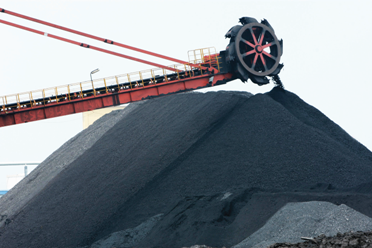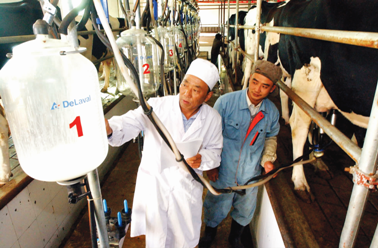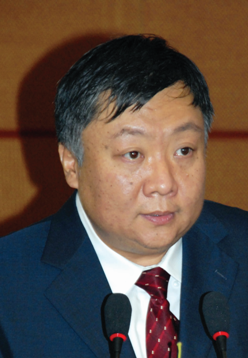

The recently observed trend of China's state-owned enterprises encroaching on the domain of the country's private sector has been dubbed "advance of the state and retreat of private enterprise" (guojin mintui). The huge amount of funds that have flowed to China's SOE as part of the loose credit that has accompanied the country's 4 trillion yuan stimulus package, is often seen as one of the drivng forces behind the new trend, but as the following articles show, a government desire to "clean up" an industry - whether it be lax environment and work safety laws, economic inefficiencies or threats to food safety - are also leading to the entry of the state into various industries.
Below we examine the de-facto nationalisation of Shanxi's coal mines, the country's dairy giants and Shandong's largest private steel company.
 Cleaning Up Shanxi's Coal Mines
Cleaning Up Shanxi's Coal Mines
By Yang Guang
Nation, page 10
Original article: [Chinese]
Over the past year, Shanxi has been swept by a drive to incorporate small private coal mines into larger state-owned mining conglomerates.
As part of the transition, much of the local level corruption that has allowed smaller players in the industry to bend various work safety, environmental and transportation rules is gradually disappearing.
Furthermore, the lifestyles of both the private coal mine owners and the local officials that relied on them as are source of gray income, are also changing.
Losing Power
"The shutdown of private coal mines has had a huge impact on us. However, we can't talk about it in public as it involves certain unspoken rules," Liu Jianjun, a director of coal mine safety at a local government agency, told the Economic Observer.
He went on to describe how before the coal mine consolidation drive began, local administrators in charge of coal mine safety and local environmental protection were the most influential and powerful bureaucrats in Shanxi. Many officials grew rich through their "regulation" of the private coal mines.
"In order to pass the frequent government inspections, many private coal mine owners sent money directly to local officials," he recalled.
In addition, when traditional Chinese festivals were approaching, private coal mine bosses would send money to local officials responsible for monitoring safety at the mines.
According to an official we spoke to, local bureaucrats were earning anywhere between thirty thousand to hundreds of thousands of yuan a year.
However, as these smaller players gradually began to exit the scene and their mines were merged into the larger state-owned mining companies, life for Liu, and for other local government regulators like him, has become a lot more relaxed.
Previously, he might conduct up to fifty coal mines inspections a month, with particular attention being paid to private mines.
These days, the frequency of inspections has declined, on the grounds that the state-owned mining companies have more stringent safety precautions than private ones.
At the same time, the number of accidents occurring at coal mines is expected to decline, this too will help to reduce the pressure on local officials.
End of an Era
Zhang Jisheng, is a 56-year-old former private coal mine owner from Shanxi.
From his perspective, aside from local coal mine safety officials, the incomes of local regulators in charge of transportation and electric power will also be affected by the recent nationalization of the province's smaller mines.
He revealed that even if they were earning a small amount, private coal mine owners were forced to give regulatory bodies a share.
"If you didn't send gifts to electricity providers, they would likely cut off your electricity, If you forgot to offer presents to the transportation department, they would impound your vehicles, as for the local administration of coal mine safety and environmental protection, they would simply shut down your mine."
"Without offering bribes to these local regulators, my coal mine wouldn't be able to remain in operation for a day," Zhang said.
However, as his four mines - each with an annual output of 200,000 tons - have now been acquired by Datong Coal Mine Group, he'll no longer have to worry amount such concerns.
Searching For New Fortunes
Currently, private coal miners are busy negotiating with local governments, attempting to get the best price they can for their mines, at the same time, they’re also busy searching for new investment options.
Although Zhang Jisheng doesn’t have any firm plans for the future, he’s optimistic about investing in China's real estate market. He plans to invest in Beijing, Shanghai and other big cities.
According to Yan Kangping, president of Shanxi Xinhuan Real Estate Company, Zhang is not alone. Most of the funds of private coal mine owners has flowed into real estate market outside Shanxi.  After Melamine - The Return of the State
After Melamine - The Return of the State
By Xie Liangbing
Nation, Page 10, Issue 441, Oct 26
Original Article: [Chinese]
It's now been over a year since the melamine-tainted milk scandal shook China, but the issue of food safety raised by the scare continue to have an impact on the mainland's dairy industry.
The addition of melamine to much of the country's dairy products not only resulted in the death of six children but caused many others to develop kidney stones after drinking the chemically contaminated milk products over a long period of time.
To ensure the purity and safety of their milk, Yili Group, one of the state-owned dairy giants affected by the scandal, has co-founded small dairy cooperatives with local governments throughout Inner Mongolia.
The cooperatives are run like joint-stock companies and dairy farmers are allocated shares in return for agreeing to send their cows off to be fed, milked and housed according to uniform standards at the cooperative.
But it’s not a simple matter of ensuring the safety of dairy products, with farmers being strongly encouraged to join the dairy cooperatives, it's also an indication of the Chinese government's determination to nationalize the country’s dairy industry.
Because all the dairy associations have adopted modern breeding techniques and are providing standardized conditions for every cow, the cost of keeping the cows has declined by one to one and a half yuan per day, while the price of the final product has increased by around two yuan per liter.
In the past, dairy farmers worked their individual herds and sold their milk directly to dairy companies. This farming model is now being described as inefficient and a contributing factor to the emergence of last year's melamine scandal.
Chinese dairy giants are busy investing huge amounts of capital to set up similar cooperatives.
Mengniu Dairy Group has revealed plans to cooperate with the state-owned COFCO Group to operate a similar system to the one spearheaded by Yili.
COFCO, a huge Chinese food and grain import export company, recently bought a 20% stake in Mengniu, making it the biggest shareholder of the private company.
In recent months, all four of China’s dairy giants, Mengniu Dairy, Yili Group, Bright Dairy, Capital Agribusiness Group (formerly known as Sanyuan Group), have become companies in which the state has a controlling stake.  Du Shuanghua Bids Farewell to Rizhao
Du Shuanghua Bids Farewell to Rizhao
By Zhong Ang
Nation, Page 11, Issue 441, Oct 26
Original article: [Chinese]
Over the next six months, the Shandong-based Rizhao Iron and Steel Company, one of China's largest private steel companies, will be merged with the state-owned Shandong Iron and Steel Group.
The merger agreement will result in Shandong Iron and Steel Company holding a 67% stake in the newly-formed company, while Rizhao will control the other 33%.
According to a recent ranking of China's top 500 companies published by the China Enterprise Confederation & China Enterprise Directors Association (CEC/CEDA), Shandong Iron and Steel Company had an operating revenue of 120.5 billion yuan, while Rizhao's was 47.18 billion yuan.
This means that the newly expanded Shangdong Iron and Steel Group will have a combined revenue of 167.692 billion yuan, exceeding that of Hebei Iron and Steel Group, making the expanded group the second largest of China's steel companies.
Founded in 2003, the Rizhao Iron and Steel Company made the most of its advantage of being a well-managed private firm and rapidly expanded in a sector dominated by large state-owned enterprises.
Du Shuanghua, the chairman of the Rizhao board, was ranked second in the Hurun Report of 2008 (though he dropped to 41 last year), an annual ranking of China's wealthiest individuals.
He amassed an estimated personal wealth of 35 billion yuan through his management of Rizhao.
Although the central government's desire to consolidate ownership of the country's steel factories is one of the main reasons behind the merger of the two companies, another motivations for the acquisition came from the state-owned company’s desire to build a 2,000 ton-capacity cast steel production base.
As Rizhao had already begun work on a similar project and new policies aimed at curbing overcapacity in the steel sector prohibited local governments from giving approval to new steel projects, Shandong Steel had yet another reason to pursue a merger with Rizhao.
Although Du was eventually all but forced to accept the take over, he plans to remain in charge of his company over the next six months and after that he has agreed to "rent" control of the new company until the first phase of Rizhao’s cast steel project begins.
Meanwhile, he knows that he needs to start looking for new opportunities. Given the current policy environment, he won't be able to establish a new steel company, instead he's shifted his attention to opportunities in the shipping sector and iron ore markets.

